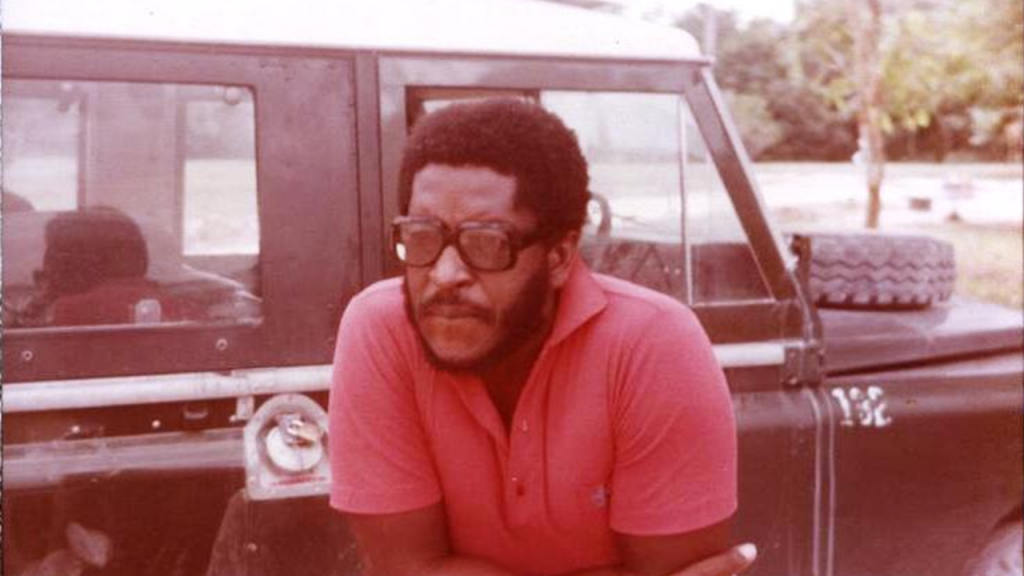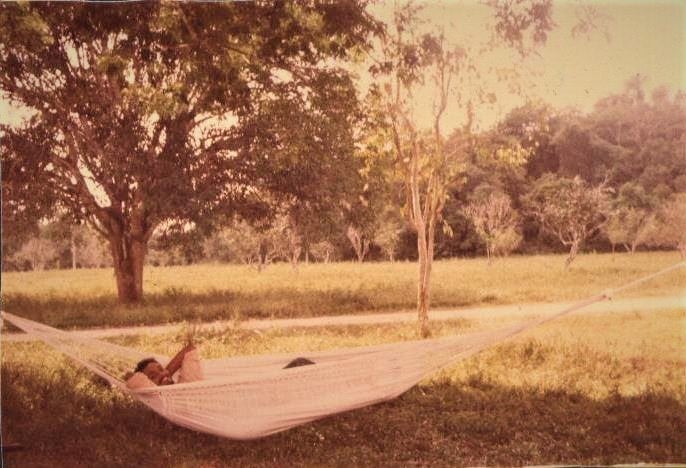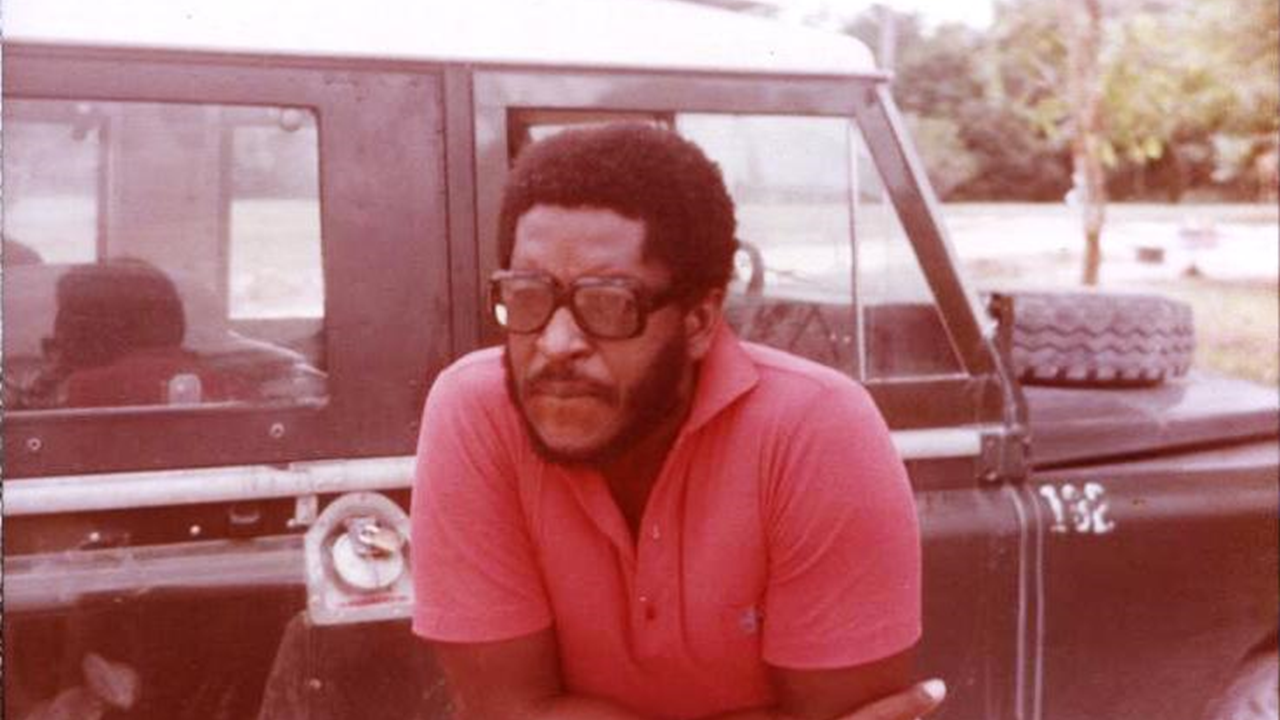Linden Forbes Sampson Burnham (20 February 1923 – 6 August 1985) was a Guyanese politician and the leader of the Co-operative Republic of Guyana from 1964 until his death. He served as Prime Minister from 1964 to 1980 and then as its first Executive President from 1980 to 1985. He was the head of the PNC (People’s National Congress) which was the ruling party and was supreme. He was a man with a mission, to remake Guyana in his own image. That made for politics tending towards totalitarianism. Burnham nationalized the major industries that were foreign-owned and controlled, reducing the private sector’s share of the economy to 10% by 1979. He aligned with Cuba and Russia and ushered in a period of communism which he called Cooperative Socialism. Everyone was called ‘Comrade’, but if anyone thought that made them equal to his boss, he was in for a shock. Communism didn’t stop Burnham from amassing personal wealth until he was declared one of the wealthiest national leaders of the time. Trade unions became extremely strong and overbearing and appointments to high office including for industry management positions were more based on ideological affiliation than technical qualification. The resultant fall in output, quality and revenue was entirely as could be expected but was denied. Guyana was a nation in denial and anyone disagreeing could expect to meet a messy end. When I landed in Guyana in 1979, the infamous Jonestown massacre had happened in the previous year, resulting in the deaths of 981 people in a mass suicide and the murder of others, including a US Senator, at the behest of the cult leader, Rev. Jim Jones who ran away from California and established his cult in Guyana. The massacre was the result of mass suicide which he initiated and which his followers committed. Guyana was in the news but for all the wrong reasons.
Almost the first lesson I learnt from advice given to me was that it was wise to keep one’s nose clean at all times and be very careful about what one spoke. I remember a ‘funny’ story that a friend of mine who is a priest in Georgetown and speaks German, told me. He said that once he was in the state-owned department store, Guyana Store, when he overheard some German people loudly criticizing the policies of the Executive President. He went up to them quietly and whispered, “Wir haben hier auch Geheimpolizei”, (We also have secret police here.) He said, “They were from East Germany and knew the meaning of Geheimpolizei (secret police) and disappeared from the store with great alacrity.” That was the overall atmosphere of Guyana at the time I landed there in 1979.
Race was the underlying thread in any conversation. People of Indian origin (called East Indian) were demographically the most numerous, forming about 60% of the population. But politically they were not significant and had almost no representation in the military or police. People of African origin were politically much more active and were by far the majority in the military and police. Other races were Amerindian (live mostly in the bush), Mixed (European, Indian, Chinese, African, Amerindian, Imagination). But all were Guyanese, quick to laugh, big hearts and great friends.
In 1964 there had been ‘Race Riots’ where East Indians were killed allegedly by African Guyanese and the tensions were still just under the surface. I was a foreigner and so was treated differently and cordially and in Kwakwani where I lived, I had good friends and didn’t experience any tension on account of race. This attitude towards foreigners was so peculiar that I once had to go to Georgetown to a government office for something. People told me to be prepared to stand for many hours in a queue or to bribe the guards. I was not happy about the first and not about to do the second. One friend however told me, ‘Just say that you are not Guyanese and that you are a foreigner.’ I thought that was highly peculiar. Why would a foreigner get precedence over a citizen? But I was willing to try anything, so I did. As soon as I mentioned this to the guard, I loed and beheld that I was ushered to the head of the queue and anyone who gave a quizzical look was told, ‘Ee na Gayanese’. They all smiled and nodded, indicating that this was very much in order. Maybe it was Guyanese hospitality at work or something else. But whatever it was, it worked, and I got my work done in record time.
However, there were exceptions and one of them was Nancy Denny (not her real name), African Guyanese. Nancy’s job was as the secretary of the Mines Manager (the Big Boss), but she was also the District Coordinator of the ‘Party’ and behaved as if she was the President of the country. So, she was a big noise. I was the Assistant Administrative Manager and so functionally I had authority over her which she resented. Nancy would take time off on the pretext of ‘party work’ and disappear, leaving her work with others who resented this, but did not have the courage to tackle her. One day she did her usual disappearing act and then ended up in the Kwakwani Club having a drink during working hours. I was passing by and saw her and suspended her pending investigation. That was like stepping on the tail of a mamba. Given her political position, this was a slap in the face that she was not going to take lying down.
Next morning Nick called me to his office. He had a grave look on his face. He asked me, ‘What happened between you and Nancy?’ I told him about the drinking incident and the following suspension pending investigation, which was according to the rule book. Nick was aware of Nancy’s doings himself but told me that the Minister of Mines had called him and asked him to enquire. I explained what I had done and Nick being a man with moral courage, supported me. He called the Minister and explained what had happened and why. I am amazed today, having seen a great deal of the world, how, given the political situation in Guyana of those days, Nick stuck his own neck out to stand up for me. He taught me a lesson of standing up for your subordinates when they are right, which I will remember all my life. This is Nick for you. A man that I admire, respect, and love with all my heart.

On a side note let me tell you a story about Nick Adams that shows what a noble man he was. More than 20 years before I met him in 1980, when Guyana was still a British colony, Nick lived in Linden, Demarara. He received a summons from a court in Corentyne to appear in a paternity case. In those days, to get from Linden to New Amsterdam was neither easy nor quick. It took him over 24 hours to get there. The next morning, he appeared in court. His name was called.
The judge said, “Are you James Nicholas Adams?”
“Yes, Your Honor.”
“This young lady (the judge pointed to a young woman with an infant) claims that you, James Nicholas Adams are the father of her child and have abandoned them.” He then said to the young woman, “Young lady, is this the man who you claim is the father of your child?”
The lady looked at Nick and said, “Your Honor, this is not the man. I don’t know who this man is. He is not the father of my child.”
“But this is James Nicholas Adams,” said the judge.
“Yes, Your Honor. But he is not the man who is the father of my child. I think either the man who is the father of the child has the same name or lied to me about his name.”
“Mr. James Nicholas Adams, you may go. The allegation against you is dismissed. The court regrets the inconvenience caused to you. Case dismissed.”
But Nick was not finished with the matter. He said to the judge, “Your Honor, may I have permission to speak?”
“Yes,” said the judge.
“Your Honor, the case may be over from a legal perspective, but we still have a real problem. How will this young lady look after her child? Therefore, I would like to request the court to award her child support and give me the responsibility for it. I will pay her every month.”
The judge was flabbergasted. “Do you know what you are saying? You are asking me to award her child support which you will pay, which means that until that child is 21 years old, you will support that child. You have never seen this woman in your life, and you have nothing to do with her or her child. Why would you do this?”
“I would like to do this because if we cannot solve her problem then what is the use of her approaching the court?”
So, it was done. And Nick Adams paid for the raising of a child which was not his own and who he never saw again in his life. That was the man who I was proud to call my boss and who was a father figure to me.
To return to my Nancy story, the matter did not end with that because the lady in question would not let it rest. She demanded that I withdraw the suspension – I refused. So once again the Minister called Nick and said that he wanted to meet me. Nick said to me, ‘I just had a call from the Minister of Mines, Cd. Hamilton Green. Comrade Green wants to see you.’ I asked, ‘When?’ Nick said, ‘Now. So, get ready and go. Nancy has complained to him about you. I will support you in this so don’t worry but you have to satisfy the Minister. Otherwise, things can get difficult (he meant that I could summarily be sacked and sent back to India).’ But there was no escape as I was not willing to back down from my stance, which I was completely convinced, was right. It was also a matter of asserting my authority without which my life would not have been worth living.
I arrived in Georgetown late in the afternoon after a 4 – hour drive. I entered the anteroom where Comrade Green’s secretary sat. I introduced myself but it appeared that I was famous. They all knew me. I was not sure if I should be happy or alarmed about this. His secretary told me, ‘Show your face through that window and he will open the door.’ The door was a massive black steel structure with a small window and a little sliding shutter. It was like the door of a prison cell. I slid aside the shutter and looked in as instructed. At the far end of the large room, I saw a huge mahogany desk with a Guyanese African gentleman sitting behind it, manicuring his nails. All the tools for this high precision job were neatly laid out before him. The mahogany desk had a long table perpendicular to it on either side of which were arranged chairs, like around a dining table. It was like a Boardroom setting, convenient for discussions and in arbitrations, which the Minister presided over. He saw me peering through the glass and reached under the tabletop and pressed a button which buzzed and released the lock so that I could go in. The door clicked shut behind me and there I was in the presence of the Honorable Minister of Mines, Cd. Hamilton Green himself.
I realized that the whole office was furnished and arranged to intimidate and put the other at a disadvantage. Cd. Green’s manicuring was the strangest thing that I had ever seen and to this day I can’t think of why he did it. I remained standing. He looked me up and down and then gestured for me to sit. I took a chair a couple of seats away from him and waited for the crucial interview to begin.
‘So Mr. Baig, you are from India?’
‘Yes Sir.’
‘What do you think of Mrs. Gandhi?’
‘I think she is a good leader Sir. She is good for our country.’
‘But some people don’t seem to like her, no?’
‘Isn’t that the case with most strong leaders Sir?’
‘Yes, that is true.’
Then he came to the point of the interview. “So, what’s the issue with our friend Comrade Denny in Kwakwani?”
“Sir”, I said, “to put it politely, her attitude at work is an embarrassment to the Party that she represents. She does not work, plays politics, throws her weight around, and generally behaves as if she owns the place. I believe this is not the impression that the PNC wants to create among the people. I tried every way I could to convince her to be a good example that would be worthy of someone who is the District Coordinator, but she will not listen. So eventually, I had no alternative but to suspend her because she was drinking alcohol at the Club bar during working hours when she was supposed to be in office. I tried to advise her, but she is a strong woman.’
‘Strong woman, eh!’ He laughed. ‘Like Mrs. Gandhi maybe! So how do you like Guyana (Giyaana – is how he and most Guyanese pronounce it)?’
‘I like it very much Sir.’
‘You don’t miss your country?’
‘Everyone misses his country Sir. But Guyana and Guyanese have been so good to me that it feels like home. I have friends here who are like my own family. So, I don’t miss my country too much.’
‘Good of you to come Mr. Baig. It was nice to meet you.’ The interview was over and by the look of it, I seemed to have survived.
All the while Mr. Green continued to manicure his nails, filing, pushing back the cuticles, and occasionally clipping an uncooperative piece. Strange way of conducting a meeting, I thought to myself. But such are the ways of the high and mighty. To give him his due, however, he was a fair man and gave me a chance to explain myself and then accepted the explanation when it made sense. I’m not sure how many people in his position in other countries would have been equally patient and understanding with a twenty-four-year-old foreigner who had taken a stance against one of their own Party functionaries.
I thanked him, walked the length of the table, the door buzzed as I came to it and opened, and I walked out. The secretary smiled at me and I left, returning to Kwakwani close to midnight and the matter was closed. The letter stuck and was not withdrawn and the lady in question toed the line. The Minister it seems told her where to get off. In the process, I acquired a huge amount of ‘respect’ because I had managed to make the reprimand stick by convincing none other than the Minister himself and because there were a lot of other poor sufferers who were delighted that the lady got what was coming to her. They did not have the power to do anything about it but were all silently rooting for me. That was an important lesson for me to take away; if you win, you will find that you have a lot of supporters. If I had been reprimanded by the Minister and ordered to withdraw the letter, then I don’t know how many of my supporters would have stood on the same side of the street when they saw me coming. Winners have many fathers and losers none.
Two other lessons from this incident; the importance of building a good case and the importance of putting it in a way that makes sense to the listener from his perspective. ‘What’s in it for me?’ is a tune that everyone listens to. It’s about speaking the truth but doing it in a way that makes sense to the listener in ways that are important to him. Nick, needless to say, was delighted.
Next morning when I went to see Nick he was smiling and said, ‘Whatever you said to Hamilton Green, Nancy seems to have got an earful from him and I don’t think you are going to have any problems with her again.’ And that is indeed what happened. Mr. Green was a just man and understood what I told him and acted upon it immediately.
Guyana was effectively a dictatorship at that time with President Forbes Burnham firmly in control. And of course, like all dictatorships it was called a democracy because the people were permitted to elect their leader, Mr. Forbes Burnham. One weekend after this meeting with Minister Hamilton Green, we got news that Mr. Burnham would visit Kwakwani. That was truly big news especially as he was to come by helicopter. I had never seen a helicopter close up and I was very excited. He would land on the helipad on Staff Hill, meet the management of Guymine, have lunch at the Club, address a public meeting in Kwakwani Park and leave. To welcome him, our Vice President Stephen Ng Qui Sang (Guyanese of Chinese origin and a wonderful man) had flown in on the company Cessna from New Amsterdam. At the appointed time, we heard the chopper and it landed in a cloud of dust. Mr. Burnham stepped out. He had quite a presence and an arrogant look on his face. He shook hands with us all and then disappeared into the Club. I was too junior to be invited to eat with him. I don’t remember much about his speech except that he spoke of the need to work to make Guyana a great country. Little did I know that I would hear many such speeches in my life, all made by similar people, saying how others should make their country great. I had read George Orwell early in life and have seen its reflections in many places. Equality has many forms, and some people are always more equal than others. President Burnham said among other things, ‘Aawee like to talk about the problems aawee facin heye. But aawe like to sit pon our sit-upons and talk about what the Go-va-men mos do an vat Mistah Bonham mos do but nevah about wa I mos do. That won’t work. Unless aawe decide to get up and help ourselves, nothing will change.’ I must say I agreed with Mr. Burnham about this. “Get off your sit-upon and do what you must do if you want to see results.” Then he left.
I became friends with the pilot of the company Cessna, a very nice Englishman whose name I have now forgotten. When he came to Kwakwani, we would eat together in the Club and just hang out while he waited for his passengers to finish their meetings. On one such trip which was on a Friday, he told me that if I wanted to go along, he would take me to Georgetown, and I could spend the weekend in town and return on Sunday night. That sounded like a great idea and I went along. He took me on a lovely ride flying low over the rain forest and following the Berbice River for a while and then the Kwakwani Trail. Seeing both of these from air was very exciting and gave me a totally different perspective of the topography. As we neared Georgetown, he said to me, ‘Let me show you something you will never see otherwise.’ I asked him what it was. He said, ‘Mr. Burnham’s house.’ And he took me on a low sweep over the President’s house and estate. I saw that the rice paddies within the enormous compound had concrete drains and waterways. Manicured gardens and forest land. And then we were off and away. It was not safe to buzz the president’s house for too long and he knew this.

Guyana was a place of great learning for me. I was alone. I had a lot of time. I loved reading. I was used to being alone and to reflecting and liked writing down my thoughts. All excellent ways to conceptualize life experience. My Guyanese friends spoke freely to me as I was a foreigner and didn’t take sides in local politics, I kept confidences and never divulged what someone told me to anyone else and for me friendships were more important than anything else. They needed to let the steam out and unload their woes and I was there for them. This gave me an extremely valuable insight into Guyanese politics, history and culture from the best possible source, the people themselves. The big topic of conversation at the time was the posturing of Venezuela, which bordered Guyana and had a border dispute. There was some chance that this could escalate to a military conflict. The Guyana Army was not able to face the much bigger and powerful Venezuelan army, but nobody would admit that. There was some talk that the Guyanese government could introduce conscription, so Peter was concerned if he would be forced to join the Army. I was a foreigner and so was in no such ‘danger.’ To speak the truth though, I would have welcomed the adventure. However, as it turned out, South Americans are far wiser than their northern cousins and the matter was resolved peacefully.
The hottest topic of course, was the government of President Burnham. This was a dangerous topic to talk about in a dictatorship where even your thoughts would be monitored if they could be, all in the name of freedom and democracy of course. But we were far away in the bush and Peter was in the company of a trusted friend. I was therefore the confidant of many ordinary people who wanted to vent their frustration with the way the country was being misgoverned. It was amazing to see how a country so rich in natural resources, so fertile, and with such wonderful people could be run into the ground so rapidly. Little did I know that in the decades after that, I would witness this in at least three other countries on different continents. Never underestimate human greed especially when it is combined with shortsightedness. Nothing can stop that slide except the call from which none can escape.

This story has a sad ending because in 1981 or so, we got news that the Cessna with my friend, the pilot had crashed in the rain forest and were never found. How a whole plane can crash and vanish is something that you can well understand if you have ever flown over the rain forest. It is like a sea of green, uninterrupted, and thick. If anything breaks through the canopy and goes down, the canopy closes over it and it would vanish as if under the waves of the ocean. Nevertheless, I always hoped that in fact he had hopped the country and was well somewhere else. He was a very nice man, and I don’t want to believe that he died alone in the forest somewhere.

Wonderfully drafted . Great things could be written in the most lucid language. So much is there to learn from u sir